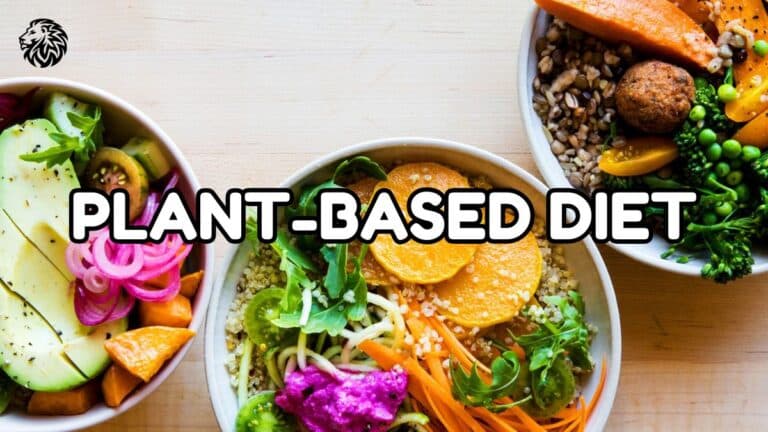A plant-based diet, at its core, revolves around consuming foods primarily from plant sources. This includes a wide array of fruits, vegetables, grains, nuts, seeds, and legumes, with minimal or no animal products. The emphasis is on whole, minimally processed foods that are rich in nutrients. It’s a diet that not only focuses on health but also considers environmental sustainability and ethical concerns related to animal farming.
In recent years, the plant-based diet has surged in popularity. This shift can be attributed to various factors, including growing awareness of the health benefits associated with plant-based eating, such as reduced risks of heart disease, diabetes, and certain cancers. Additionally, there’s an increasing consciousness about the environmental impact of meat production, leading many to adopt more eco-friendly dietary habits. Moreover, ethical considerations regarding animal welfare have also played a significant role in this dietary transition.
The plant-based diet’s flexibility and inclusiveness make it appealing to a wide range of individuals, from those who are health-conscious to environmental advocates, making it more than just a dietary choice but a lifestyle for many.
The Basics of a Plant-Based Diet

A plant-based diet is primarily focused on foods derived from plants. This includes not just fruits and vegetables, but also nuts, seeds, oils, whole grains, legumes, and beans. It doesn’t mean that you are vegetarian or vegan and never eat meat or dairy. Rather, you are proportionately choosing more of your foods from plant sources.
Differentiating Plant-Based, Vegetarian, and Vegan Diets
- Plant-Based Diet: This diet centers around plants, including vegetables, fruits, grains, nuts, and seeds. While it emphasizes plant-based foods, it doesn’t completely exclude meat or animal products. The key is the predominant consumption of plant-based foods.
- Vegetarian Diet: Vegetarians do not eat meat, poultry, or fish. However, there are several sub-categories of vegetarianism, each with their own restrictions. For instance, lacto-vegetarians consume dairy products but no eggs, ovo-vegetarians consume eggs but no dairy, and lacto-ovo vegetarians consume both eggs and dairy.
- Vegan Diet: A vegan diet is the strictest form of plant-based diets. Vegans consume no animal products whatsoever. This includes meat, dairy, eggs, and often excludes honey and gelatin as well.
Primary Food Sources in a Plant-Based Diet
The cornerstone of a plant-based diet is whole, unrefined, or minimally refined plants. A plant-based diet includes:
- Fruits: Apples, bananas, berries, oranges, peaches, pears, etc.
- Vegetables: Leafy greens, asparagus, broccoli, peppers, carrots, etc.
- Tubers and Starchy Vegetables: Potatoes, sweet potatoes, butternut squash, etc.
- Whole Grains: Brown rice, rolled oats, farro, quinoa, whole wheat bread and pasta.
- Legumes: Beans of any kind, lentils, chickpeas, peas, and peanuts.
- Nuts and Seeds: Almonds, cashews, macadamia nuts, pumpkin seeds, sunflower seeds, natural peanut butter, tahini, etc.
- Herbs and Spices: Basil, rosemary, turmeric, curry, black pepper, etc.
- Plant-based Oils and Beverages: Olive oil, coconut oil, almond milk, soy milk, coffee, tea, etc.
By basing the diet on these whole foods and minimally processed plant-based food items, one can achieve a nutritious, satisfying, and sustainable way of eating.
Health Benefits

The plant-based diet has been linked to a multitude of health benefits, supported by both nutritional studies and expert opinions. Here are some of the key health advantages associated with this diet:
- Improved Heart Health: Numerous studies have shown that a plant-based diet can significantly reduce the risk of cardiovascular diseases. This diet is typically low in saturated fat and high in fiber, which helps lower blood pressure and cholesterol levels. The American Heart Association also supports the idea that diets rich in fruits, vegetables, and whole grains can help prevent heart disease.
- Weight Management: Plant-based diets are often rich in fiber, which can help in feeling fuller for longer periods and reduce calorie intake. This can lead to natural weight loss and maintenance without the need for calorie counting or portion control. A study published in the Journal of General Internal Medicine found that participants on a plant-based diet lost more weight compared to those following other diets.
- Reduced Risk of Type 2 Diabetes: A plant-based diet can also play a significant role in preventing and managing type 2 diabetes. Foods in a plant-based diet have a lower glycemic index and are less likely to cause spikes in blood sugar levels. According to a study by the National Institutes of Health, this diet can improve insulin sensitivity and lower the risk of developing type 2 diabetes.
- Cancer Prevention: Some research suggests that following a plant-based diet may reduce the risk of certain types of cancer. This is attributed to the high levels of vitamins, minerals, and antioxidants found in fruits and vegetables, which can protect cells from damage. The World Health Organization has reported that diets high in fruits and vegetables may help prevent cancer.
- Improved Digestive Health: The high fiber content in a plant-based diet supports healthy gut bacteria, leading to improved digestion and bowel health. This can alleviate problems like constipation and reduce the risk of gastrointestinal diseases.
- Overall Health and Longevity: Plant-based diets are linked to overall better health and longer life expectancy. A study published in The Lancet found that people who consume higher amounts of fruits and vegetables have a lower risk of mortality.
- Mental Health Benefits: Emerging research suggests that a plant-based diet may have positive effects on mental health, including a lower risk of depression and improved mood. This is potentially due to the high levels of nutrients found in plant-based foods that are important for brain health.
In conclusion, adopting a plant-based diet can lead to significant improvements in overall health, potentially reducing the risk of various chronic diseases and enhancing quality of life. However, it is important to ensure that the diet is well-planned to meet all nutritional needs.
Getting Started: Tips for Beginners

Transitioning to a plant-based diet can be a rewarding and healthful journey, but it may seem daunting at first. Here are some practical tips to help beginners navigate this change:
- Start Slowly: You don’t have to go plant-based overnight. Begin by incorporating more plant-based meals into your diet gradually. For instance, start with Meatless Mondays or choose plant-based options for one meal a day.
- Introduce Variety: Explore a wide range of fruits, vegetables, grains, and legumes. Trying new foods can make the transition more enjoyable and less repetitive. Include colorful and diverse ingredients in your meals to ensure a broad spectrum of nutrients.
- Plan Your Meals: Meal planning can be a useful tool in ensuring you have healthy, plant-based options readily available. Preparing meals in advance can also reduce the temptation to revert to non-plant-based options when you’re hungry.
- Educate Yourself on Nutrition: Understanding the nutritional content of foods is key in a plant-based diet. Ensure you’re getting enough protein, iron, calcium, vitamin B12, and omega-3 fatty acids, which are common concerns in plant-based diets.
- Learn to Read Labels: Not all products that appear plant-based are healthy or even fully plant-based. Learn to read nutrition labels to identify hidden animal products, added sugars, and unhealthy fats.
- Substitute Wisely: Find plant-based substitutes for your favorite non-plant-based foods. For example, use almond milk instead of cow’s milk, or try plant-based burgers instead of beef.
- Experiment with Recipes: There are countless plant-based recipes available online and in cookbooks. Experimenting with different recipes can keep your diet interesting and satisfying.
- Incorporate Whole Foods: Focus on whole, minimally processed foods, which are the healthiest options in a plant-based diet. Avoid over-relying on processed plant-based foods, which can be high in salt, sugar, and unhealthy fats.
- Connect with a Community: Join plant-based groups, online forums, or local communities for support and advice. Sharing experiences and tips with others can make your transition smoother.
- Listen to Your Body: Pay attention to how your body reacts to the new diet. If you experience fatigue, digestive issues, or other health concerns, consider consulting a dietitian to ensure your diet is balanced.
Remember, transitioning to a plant-based diet is a personal journey, and it’s important to find a pattern of eating that works best for you. With the right approach, you can make the change enjoyable and sustainable.
Planning Your Meals

When following a plant-based diet, it’s crucial to ensure that your meals are nutritionally balanced. This means incorporating a variety of foods to meet your daily needs for vitamins, minerals, protein, fiber, and healthy fats.
Guidance for Well-Rounded Meals
- Include a Protein Source: Plant-based protein is vital for muscle repair and overall health. Include sources like beans, lentils, chickpeas, tofu, tempeh, and edamame in your meals.
- Add Whole Grains: Whole grains provide essential carbohydrates for energy, along with fiber, B vitamins, and minerals. Options include brown rice, quinoa, whole wheat bread, barley, and oats.
- Include a Variety of Vegetables: Vegetables are packed with vitamins, minerals, and antioxidants. Aim for a mix of different colors to ensure a range of nutrients.
- Incorporate Healthy Fats: Healthy fats are important for brain health and absorption of fat-soluble vitamins. Include sources like avocados, nuts, seeds, and olive oil.
- Don’t Forget Fruits: Fruits are a great source of vitamins, minerals, and fiber. They can be included in meals or eaten as snacks.
- Stay Hydrated: Drink plenty of water throughout the day. Herbal teas and infused water with fruits are also good options.
Sample Meal Plans
Breakfast
- Oatmeal topped with almond milk, chia seeds, berries, and a sprinkle of nuts.
- Whole-grain toast with avocado and a side of sautéed spinach and mushrooms.
- Smoothie with spinach, banana, plant-based protein powder, and almond milk.
Lunch
- Quinoa salad with black beans, corn, avocado, tomatoes, and a lime vinaigrette.
- Whole grain wrap filled with hummus, mixed greens, cucumber, and shredded carrots.
- Lentil soup with a side of whole-grain bread.
Dinner
- Stir-fried tofu with broccoli, bell peppers, and carrots served over brown rice.
- Spaghetti with plant-based meatballs and a side of roasted vegetables.
- Chickpea curry with spinach served with whole grain naan or rice.
Snacks
- Sliced apple or banana with almond butter.
- A handful of mixed nuts and dried fruits.
- Carrot and cucumber sticks with hummus.
- Air-popped popcorn sprinkled with nutritional yeast.
Remember, the key to a successful plant-based diet is variety. This ensures not only a range of nutrients but also keeps meals interesting and enjoyable. It’s also important to adjust portion sizes and ingredients based on individual nutritional needs and preferences.
Dealing with Challenges

Transitioning to a plant-based diet can present several challenges and misconceptions. Here’s how to address and overcome them:
- Protein Sources: A common misconception is that plant-based diets don’t provide enough protein. Plant-based protein can be found in lentils, beans, chickpeas, tofu, tempeh, seitan, nuts, seeds, and many whole grains. Incorporating a variety of these sources ensures adequate protein intake.Solution: Educate yourself about plant-based protein sources and include them in your meals. Consider using a food tracking app initially to monitor your protein intake.
- Dining Out: Finding plant-based options at restaurants can sometimes be difficult, especially in areas where such diets are less common.Solution: Research restaurants in advance to find those with plant-based options. Don’t hesitate to ask the chef to modify dishes to be plant-based. Many restaurants are accommodating of dietary preferences.
- Social Situations: Social events can be challenging, especially if the host is unaware of your dietary preferences.Solution: Inform hosts in advance about your diet. Offer to bring a plant-based dish to share. This not only eases the burden on the host but also introduces others to plant-based eating.
- Nutrient Deficiencies: Concerns about nutrient deficiencies, such as vitamin B12, iron, calcium, and omega-3 fatty acids, are common.Solution: Include fortified foods and consider supplements for nutrients that are harder to obtain from a plant-based diet, like vitamin B12. Dark leafy greens, fortified plant milks, and cereals can help increase iron and calcium intake.
- Family Meals: Preparing meals that cater to both plant-based and non-plant-based family members can be challenging.Solution: Create base dishes that are plant-based, and then add animal proteins for those who prefer them. This way, you’re not cooking entirely separate meals.
- Misinformation and Skepticism: Misinformation and skepticism from friends, family, or online sources can be discouraging.Solution: Arm yourself with facts from reputable sources. Share your reasons for choosing a plant-based diet and its benefits, but also respect others’ dietary choices.
- Time and Convenience: Some people find preparing plant-based meals time-consuming and less convenient than other diets.Solution: Utilize meal prep to save time. Batch cook staples like grains and legumes. Keep a stock of healthy plant-based snacks for convenience.
- Variety and Flavor Concerns: Some worry about getting bored with plant-based foods or missing the flavors they are used to.Solution: Experiment with international cuisines, which often have a plethora of plant-based dishes. Use a variety of herbs, spices, and seasonings to add flavor to your meals.
By anticipating these challenges and having strategies to address them, you can maintain a healthy and enjoyable plant-based diet while navigating various social and practical situations.
Conclusion
Adopting a plant-based diet is a journey that offers numerous benefits for your health, the environment, and animal welfare. This article has guided you through the essential aspects of embracing a plant-based lifestyle:
- Understanding Plant-Based Diets: We defined what a plant-based diet entails and differentiated it from vegan and vegetarian diets. The emphasis is on whole, minimally processed plant foods.
- Health Benefits: A plant-based diet is linked to improved heart health, effective weight management, reduced risk of chronic diseases like type 2 diabetes and certain cancers, and overall enhanced well-being.
- Getting Started: We provided practical tips for beginners, emphasizing the importance of starting slowly, exploring diverse food options, and understanding nutritional needs.
- Meal Planning: The importance of balanced nutrition in a plant-based diet cannot be overstated. We discussed how to create well-rounded meals and provided sample meal plans to ensure you get all necessary nutrients.
- Overcoming Challenges: Addressing common challenges, from protein sources to social situations, we offered solutions to help you navigate these hurdles effectively.
A plant-based diet is more than a dietary choice; it’s a lifestyle that can lead to a healthier you and a healthier planet. While the transition may seem daunting initially, it can be a deeply rewarding and transformative experience. Remember, this is a personal journey, and it’s important to explore at your own pace, making adjustments that suit your individual needs and preferences.
The benefits of a plant-based diet extend beyond personal health, contributing to environmental sustainability and animal welfare. As you embark on this journey, keep in mind the positive impact your choices have on the world around you. Whether you choose to dive in headfirst or gradually incorporate plant-based meals into your diet, every step towards a plant-based lifestyle is a step towards a healthier, more sustainable future.







